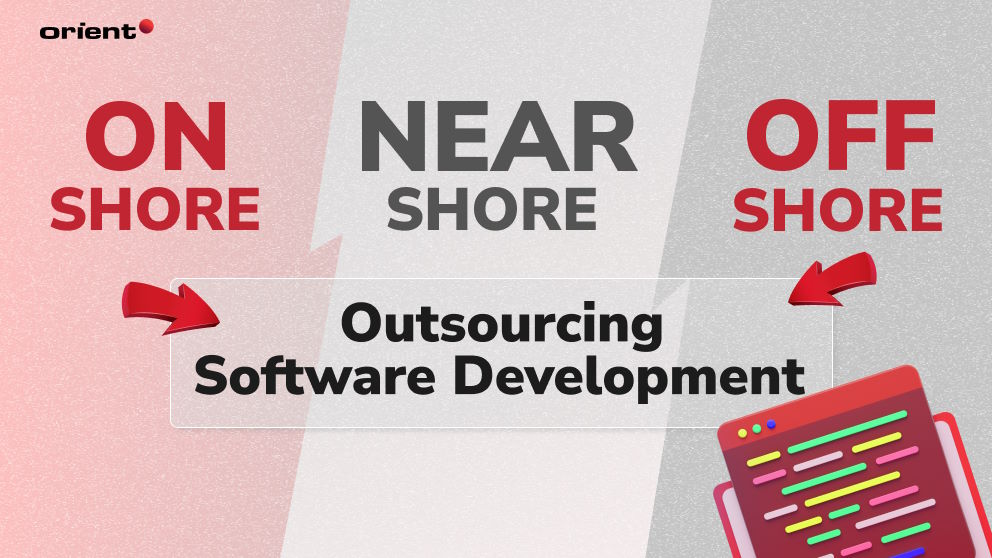Onshore Vs. Nearshore Vs. Offshore Outsourcing Software Development: Which Path to Go?

Content Map
More chaptersMany businesses choose a third party to handle certain aspects of work, such as customer services, business processing, call center activities, consulting, marketing, and supply chain management, among others. It is outsourcing that helps to reduce costs and boost productivity. Software development is no exception; tech companies or startups can entrust a middleman with their business processes or augment the in-house team with outsourced developers. The so-called third party that deals with these tasks is known as a service provider, an outsourcing company, or an IT development partner.
Such companies provide efficient and cost-effective software outsourcing services. When the IT department is outsourced to a third party, the effort and labor are well distributed, and the in-house workload is reduced. A typical outsourcing partner has access to a bigger pool of talent and often boasts dedicated teams of professional individuals who are experienced and have the resources to perform tasks given by customers or participate in collaborative projects. There are various outsourcing models, but all service providers are put into three main location-based categories: Onshore, nearshore, and offshore outsourcing.
On the whole, you may find lots of similarities between these three models, which makes it easy to be misled into thinking that there is no significant difference between them. However, they truly differ from each other by not only the geolocation but also many other characteristics.
What Is Onshore Software Development Outsourcing?

It is an arrangement in which you – a client – hire local personnel or use services provided by a vendor located in the same country as yours. This business approach is called onshoring or domestic software development outsourcing. For example, a software development company based in the United States outsources its project to a service vendor in the same, nearby, or neighboring state as long as within its own country.
Why Onshore Outsourcing?
Onshore outsourcing allows you to harness local talent without expanding your in-house team and bearing the overhead costs associated with salaries, perks, infrastructure, etc. This outsourcing option enables you to cut costs where possible and fill the skill gaps within the existing workforce with no need for long-term obligations. IT staffing services provide the flexibility that allows business owners and project managers to adapt their teams according to the demands of their projects at different periods of time. This means you can adjust your team composition based on your current needs without disrupting your existing structure.
Moreover, onshore companies and their personnel are geographically close by and within the same time zone. Proximity means they can deliver presentations, conduct regular face-to-face reports, and attend meetings physically as frequently as possible if needed. Clients have the convenience of visiting and discussing project details with the team in person and getting a feel of their work culture, which is often a vital factor for efficient project management and building relationships when outsourcing.
In addition, since there are no linguistic and cultural differences, onshore outsourcing makes the workflow and conversations between clients and providers smoother. For this reason, the onshore model ideally works for businesses that require close collaboration and real-time communication.
However, onshore outsourcing is generally much more expensive. This is because there are high costs involved in using the local services of onshore companies. For example, in the U.S., the hourly rate can be as high as $200. But this might prove to be better in the long run instead of hiring full-time employees and then training them.
What Is Nearshore Software Development Outsourcing?

Similar to the aforementioned counterpart, nearshore is an outsourcing approach wherein you can contract with an IT partner from a neighboring country for specific needs, which can be anything from staffing, consulting, or project-based services. Nearshore companies are situated in the same time zone and border or within close proximity of yours. Perhaps an example will clarify your doubts. A company in the United States outsources its software project to a software development firm based in Canada. Although it is a foreign country, the distance between them is minimal.
Why Nearshore Outsourcing?
The most apparent reason why businesses opt for nearshore outsourcing is cost savings – the same motive they have for onshoring. Either onshore or nearshore outsourcing software development is advantageous for businesses situated in regions with higher labor costs, such as Eastern Europe or the United States. But nearshoring gains a better edge.
When you make a move to reach out to the neighboring countries, you can unlock access to a broader range of service providers as well as a larger array of experienced developers. As the resources are sufficient, the pricing tends to hover in the mid-range. This is a win-win situation where you stand a better chance to staff your project and offload tasks that require high technical abilities to skilled professionals who charge less than those in your local areas.
Aside from the monetary advantage, nearshore outsourcing still maintains a fine level of management over your project, thanks to the geographic proximity. Plus, communication is more convenient as the nearshore development team is located nearby. Also, reaction time is shortened. Therefore, there will be fewer travel or quality control issues, and you – business owners – can easily visit the job site whenever required.
Last but not least, the nearshore partner shares a similar or same culture and maybe speaks the same language. Hence, a close-by outsourcing team and you will meet fewer problems and disputes caused by any cultural clash or language barrier compared to a long-distance outsourcing company. In case of disagreements or conflicts, you can drop by and quickly work the issues across clearly with your nearshore developers with minimum interruption and misunderstandings.
What Is Offshore Software Development Outsourcing?

The term “offshore” talks much about this outsourcing model. Also known as remote outsourcing, this is a business strategy in which a company transfers a business process or operation to an external provider or team located in a far-off part of the world.
In contrast to onshore and nearshore, offshore development outsourcing involves a significant geographic distance, time zone difference, and often a cultural or linguistic barrier between the client and the outsourcing partner. If your company is in the United States and delegates your project development process to Vietnam, you are offshoring. As a slight digression, Vietnam is an emerging IT destination for offshore companies and services.
Why Offshore Outsourcing?
Offshore outsourcing is considered the most financially viable. The significant cost-savings come from the affordable services and labor in the country or region where you are offshoring. It takes a minimal investment to start an offshore team or development center, bring them on board at a much lower wage rate than that of your local country, and enjoy the same quality work as other outsourcing options. For example, the rate for onshore outsourcing in the U.S. is close to $200/hour, whereas if you outsource to Asia, this rate can be reduced to $15-25/hour. As a start-up, this can be hugely beneficial as you might not be able to spend too much on specific tasks.
Offshoring is also a way out for companies or tech hubs with limited access to IT talent. In addition to cost reduction, a capable offshore partner aids you a lot in leveraging global talent and accessing highly skilled professionals from their local areas.
The only problem with offshore outsourcing is that distance makes communication difficult. Easy communication or in-person visitation is not what you can expect from this outsourcing model. The team offering outsourcing services is situated quite far away, and you might have difficulty finding the right time to contact them. Frequent travel will also increase costs. Therefore, offshore outsourcing is usually preferred for work that can be done remotely and virtually. This makes the whole collaboration between you and the outsourcing company relatively hassle-free.
While the services provided are of top quality and the tasks are done efficiently, it is also necessary to factor in language barriers and cultural differences. Standardizing communication is imperative to help the information flow across the two groups.
Key Differences Between Nearshore, Onshore, and Offshore Outsourcing Models

When you check the nearshore, offshore, and onshore statistics, significant differences are seen in cost, timing, convenience, capability, and communication. In addition, the difference between these models of outsourcing software development plays a vital role in understanding which type of outsourcing is better for collaborative work.
Now that we have gone through the definition and potential benefits of each location-based model. It is time for a close onshore vs. nearshore vs. offshore comparison:
Costs
One of the significant advantages of outsourcing that most companies strive to grasp is to save money and resources. Of that, labor costs take up a massive percentage. The developers’ salary ranges greatly vary by location. Onshore outsourcing may not offer much in this regard compared to nearshore and offshore outsourcing. Nearshore and offshore companies can commit to delivering services and providing staff at a much lower rate due to the advantages of local wages and costs of living. To put it simply, onshore, nearshore, and offshore outsourcing represent three tiers of cost reduction when it comes to labor expenses and service charges. Of these, offshore outsourcing offers the most significant cost savings.
Cultural Differences
Working across cultures can be a challenge in outsourcing. In onshore or nearshore outsourcing, the team members are usually from countries with similar cultures to your own, so it is easier to bridge and understand cultural norms. Offshoring involves working with people from different time zones and cultural backgrounds, making the process slightly more complicated.
Language Barriers
The hurdle of languages can also be a potential issue when it comes to outsourcing, especially with offshore outsourcing. Collaborating with team members who speak different languages may result in misunderstandings and delays in communication. In onshore and nearshore outsourcing, the language gap is less of a problem as the teams usually share a common language or have proficient English skills.
Fortunately, English fluency is no longer a concern as most businesses from offshore technical hubs pay attention to bridging the linguistic divide in order to drive more foreign clients.
Time Zone Differences
Along with the geographic distance, the time zone is the most tangible difference between the three outsourcing options. While the difference in time zones is a potential drawback, most offshore outsourcing companies are flexible. They can work off-hours to ensure that your projects are delivered on time and flawlessly.
Scalability
Another factor that sets these outsourcing models apart is scalability. Onshore outsourcing may not always have a wealth of talent available due to limited resources in certain areas. Under this model, it is more costly, time-consuming, and challenging to ramp up as quickly or significantly as needed. Nearshore has a bit fewer troubles in this term, but not as much as remote outsourcing. Offshore outsourcing can offer more flexibility when it comes to scaling up a team or project, thanks to their access to a bigger pool of talent.
Onshore, Nearshore, and Offshore Software Development Team: Navigate Through Your Right Selection
Whether it is offshore, nearshore, or onshore software development outsourcing, there is no one-size-fits-all solution for every business or project. Each model shines its own light in a particular case and under certain conditions and expectations. Choosing between them depends on the resources you have available and the type of work being done.
Now, onshore outsourcing is the option that you should consider if you absolutely have to. Onshore outsourcing shines the most in shorter-time projects. If you have a relatively small project and want to keep it on a short leash, onshore outsourcing is your best bet. Nearshore outsourcing can be an excellent option when your project requires closer collaboration or an agile methodology but encounters issues of talent shortages and cost fluctuations in your region. In that case, outsourcing to a nearby country would be the perfect solution for you.
In contrast, offshoring is a no-better option for tight-budget or long-term projects. Offshore outsourcing is absolutely no fad. It is indeed a stable, long-term development strategy for sufficient resource allocation, fast product delivery, and cost reduction. If communication and coordination across time zones and distances are what bother you, then worry no more because offshore companies are adept in using advanced technologies to bridge these gaps. Along with many other privilege advantages offered by offshoring, there is no reason to falter in such a successful outsourcing strategy like that. Of course, the choice is up to you at the end of the day. So, sleep on it and make your own informed decision when ready.
Partner Up with Us
Remember, the right IT partner is always the key to unlocking doors of value and success, so let’s choose wisely. Speaking of the chosen one, you mention Orient Software.
We are an IT powerhouse with almost two decades of operating in the outsourcing industry and empower numerous clients – startups, SMBs, and enterprises from all across the globe. Experience and expertise are not the only strengths we have in our hands. Orient has a large squad of technical talent available to start working on your projects right away.
We are headquartered in Vietnam, but we have our presence in two other prestigious tech centers – Singapore and Japan, so feel free to contact us at the location most convenient for you. Orient Software can be your onshore, nearshore, or offshore IT development partner based on where you operate your business. With Orient, you can rest assured that your needs are in capable hands. So why wait? Partner up with us today, and let’s embark on a journey of success together.







